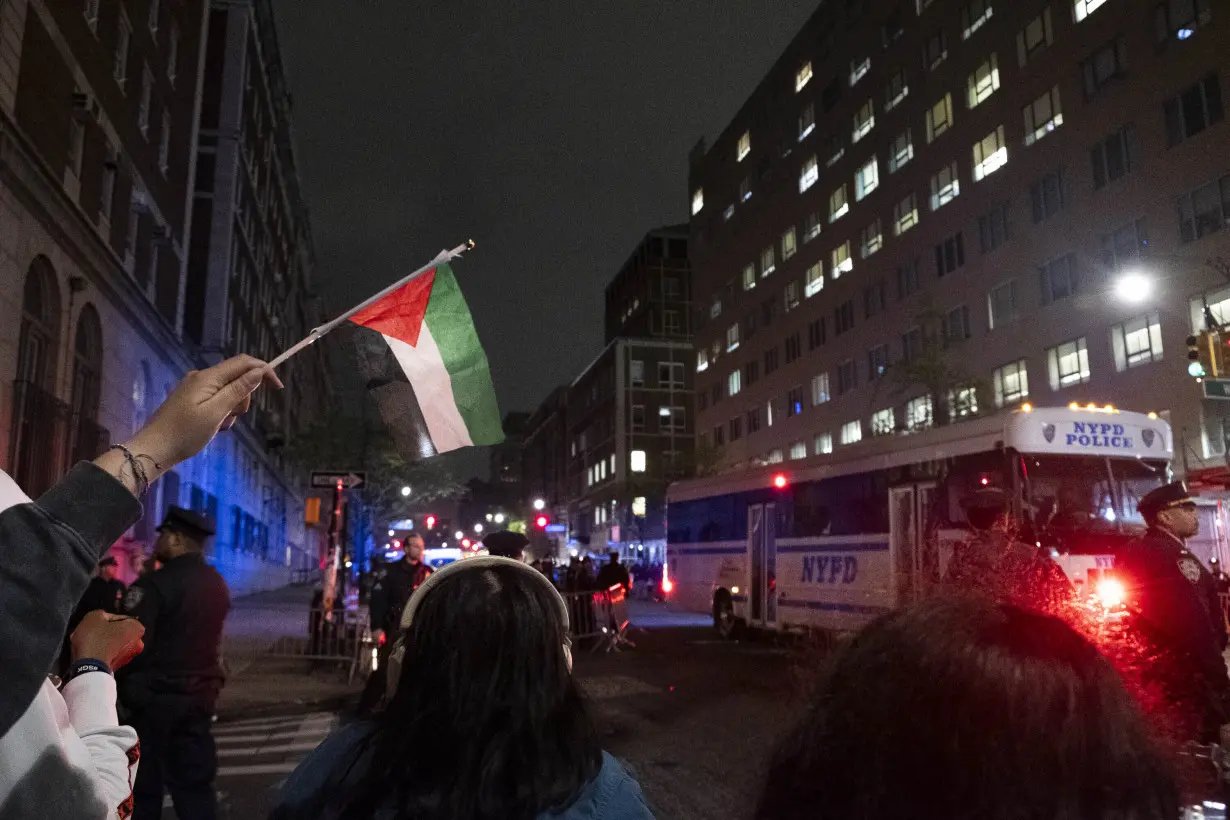Student journalists on the Columbia University campus knew what was coming long before police with riot shields arrived to begin arresting the pro-Palestinian protesters.
They had watched the situation spiral as the protesters stood their ground, refusing to abandon Hamilton Hall and using a pulley system to bring supplies into the building they had occupied.
The reporters, working for university and online U.S. and international publications, suspected negotiations with administrators were going nowhere when the protesters began donning COVID-era masks to hide their identities. Some began sleeping on the floor in journalism classrooms or offices out of fear of missing something.
But when a journalism professor began writing the phone number to call if they were arrested in permanent marker on their arms, that was the moment it became clear: They were capturing history.
The police operation Tuesday night that cleared out Hamilton Hall capped two weeks of drama over the protests at Columbia, which student journalists at the Ivy League school lived through as they were covering it.
Other media were being kept off campus, so these reporters were the only ones who could capture what was happening.
“I just woke up and I was like, I’m going to go and take some pictures,” said Seyma Bayram, a Columbia journalism fellow focused on creating a longform investigative podcast unrelated to the protests.
The encampments were a visual feast. There were musical performances, students reading and helping each other write papers for their classes. She wanted to document it all.
By Monday, students were facing suspension if they didn’t leave. Crowds marched around the encampment chanting. Students were given written notices from the administration, warning them to go. They ripped them up, dumped them in trash bins. Rumors were flying.
That night, Bayram was unwilling to go home, sleeping on her office floor.
“How,” she wondered, “are they going to remove the students. They’re not leaving.”
By Tuesday, she was exhausted. The student reporters charged their cameras and other gear, and waited.
Many protesters were starting to leave, recalled Shayeza Walid, a graduate journalism student at Columbia, who covered the arrests for the news website Al-Monitor.
The sun was setting as they held hands and chanted, knowing they faced academic repercussions by remaining. Many had given up covering their faces by now, Walid said.
To her the chants sounded like a hymn and she saw the protesters, some clad in Palestinian keffiyehs, crying. She doubts she will ever forget it.
“It felt so both inspirational and devastating because these were the kids who were willing to get arrested,” she recalled.
And then police started assembling outside, setting up barricades. Even on campus, Bayram could tell by the photos posted on social media that police action was imminent. And then the police were there.
“I don’t know, it was just like all of a sudden there were just like police, ... riot gear everywhere,” Bayram said.
The student journalists were walking backward, filming as they went, Bayram said.
She was pushed off campus. Police buses and officers were everywhere. Around her, people were being arrested.
“Those of us who are pushed out, like student reporters and faculty, I think we were just all horrified that no press was present outside of, or inside of, Hamilton Hall,” Bayram said.
Walid recalled that the reporters paired up for safety. Her partner, an international student, had never seen so many police in one place. “And frankly, I hadn’t either,” Walid said.
She said the police also seemed shocked when they came into campus and saw how few students were left. “It was very evidently disproportionate from where we were standing,” she said.
Before the arrests, protesters inside the campus used a megaphone to lead those protesting outside in chants, recalled Cecilia Blotto, a graduate journalism student, who has been publishing photos and video to Uptown Radio, a project of the university's journalism program.
“Columbia, you are a liar," she recalled them chanting, along with “Disclose, divest! We will not stop, we will not rest.”
Then Blotto saw a police buses pull up, officers exiting with shields and zip ties. Then they played a recording saying that if the protesters didn’t disperse they would be arrested.
“People were like being dragged out on the street, with like four cops holding a leg and an arm each. I saw some really, like, striking images of people, like, yelling shame at the cops, while they were dragging out students,” Blotto said. She tried to film it all.
Student radio host Macyn Hanzlik-Barend said having reporters on the scene was important to communicate what was happening at Columbia that night.
“It was not just an outside media outlet,” Hanzlick-Berand said. “It was students watching this happen to their own community and having enough poise and maturity to report live in that moment.”
Emily Byrski, a graduate student who had a phone number written on her arm in case she was arrested, said the students weren't totally unprepared. There had been a training session.
Still, she said, there had been so many false alerts.
“It’s like the boy who cried wolf. Like, there were two or three nights here where we were told, there was a rumor going around that the NYPD was coming, please come to campus,” she recalled.
Byrski had knee surgery earlier in the year, so was unable to run as police descended. She limped along with her buddy.
“So we’re sort of seeing this all happen from inside and trying to document it as the NYPD is grabbing people, like shoving them to the ground. It was pretty horrifying to see, like, right a foot away from me,” Byrski said.
She said she has seen professors cry over the last week. She is pondering it all, uncertain what to make of it.
“I’m just sort of in shock,” Byrski said. “I think we all kind of were in shock.”
___
Associated Press reporter Haya Panjwani in Washington, D.C., contributed to this report.




